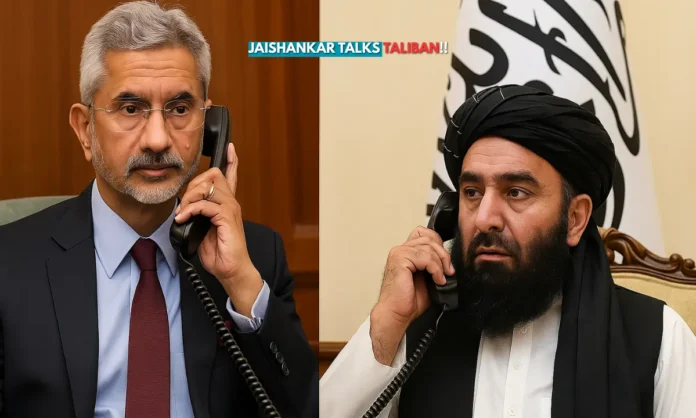Summary
- Jaishankar held a rare phone call with Taliban Foreign Minister Amir Khan Muttaqi, marking the first ministerial-level contact since 1999.
- The call followed Afghanistan’s condemnation of the Pahalgam terror attack and rejection of anti-India propaganda.
- Discussions included visas, trade, Chabahar Port, and Afghan prisoners, signalling a new chapter in informal ties.
From Silence to Signals: India’s Taliban Outreach Begins
On May 15, India’s External Affairs Minister S. Jaishankar confirmed an unprecedented diplomatic shift. For the first time in nearly a quarter-century, a sitting Indian minister publicly spoke with a senior Taliban official—Afghanistan’s Acting Foreign Minister Amir Khan Muttaqi. The call, described as cordial and strategic, signals a recalibrated Indian approach toward Afghanistan’s ruling regime.
The backdrop is significant. The Taliban government remains internationally unrecognised, and New Delhi has been cautious since the regime’s return to power in 2021. But this conversation, following Kabul’s condemnation of the April 22 Pahalgam terror attack, marks a thaw in what has been a deliberate diplomatic freeze.
India, which had kept formal distance from the Taliban, is now carefully testing informal waters. With Pakistan’s support for cross-border terrorism continuing and China’s influence growing in the region, India’s cautious but clear engagement may represent not just a pragmatic pivot—but a regional necessity.
For the first time, India has directly talked to the Afghan Taliban, signaling a strategy shift.
— 𝕷𝖔𝖗𝖉 𝕲𝖎𝖘𝖍𝖆𝖑 (@LordVishal_) May 15, 2025
We’ve told the US multiple times to stop dividing the Taliban into "good" and "bad" and treat them all the same.
But the US, for its own benefit, even cozies up to terrorists it… pic.twitter.com/u97wPpO0E9
Pahalgam to Kabul: What Triggered the Diplomatic Ice-Break
- Afghanistan condemned the Pahalgam attack, calling it harmful to regional peace.
- Jaishankar thanked Muttaqi for rejecting “false and baseless” anti-India reports.
- This was the first India–Taliban ministerial call since the IC-814 hijacking episode in 1999.
- Earlier this year, India’s Foreign Secretary Vikram Misri had met Muttaqi in Dubai.
India’s outreach comes in the wake of an unusually supportive move from Kabul: the Taliban’s strong condemnation of the Pahalgam terror attack, which killed 26 civilians and triggered Operation Sindoor. In an official statement, the Taliban government aligned with India’s position, calling the attack a threat to regional security.
What followed was perhaps even more surprising. In his call with Muttaqi, Jaishankar acknowledged the Taliban’s role in dispelling disinformation aimed at sowing distrust between India and Afghanistan—a subtle nod to the propaganda war surrounding Pakistan’s narratives.
The significance is not lost on observers. This is the first high-level call between Indian and Taliban ministers since the post-IC-814 hijacking crisis, where then Minister Jaswant Singh coordinated with the Taliban regime for hostage release. Two decades later, the context is drastically different, but the caution is similar.
Trade, Visas & Strategic Ports: What Was Discussed
- Muttaqi requested more Indian visas, especially for Afghan medical patients.
- The two sides discussed the return of Afghan prisoners from Indian jails.
- Strategic topics included Chabahar Port development and bilateral trade expansion.
- The Taliban expressed interest in broadening diplomatic and economic engagement with India.
While symbolic, the conversation also had real substance. According to Taliban officials, Muttaqi raised the need for increased Indian visas, particularly for patients and students. This is crucial for a country facing economic collapse and humanitarian strain, where India’s medical and educational infrastructure holds longstanding appeal.
Another key issue was the development of Iran’s Chabahar Port—a joint India-Iran-Afghanistan project long viewed as a counterbalance to Pakistan’s China-backed Gwadar Port. While India’s progress on Chabahar has been slow, the Taliban’s proactive interest shows Kabul’s desire to remain linked to Indian infrastructure initiatives.
Importantly, Muttaqi also discussed the return of Afghan nationals imprisoned in India—a humanitarian issue that, while sensitive, also demonstrates Kabul’s willingness to engage constructively with Delhi on matters of mutual concern.
Cautious Steps, Strategic Stakes
- India has not formally recognised the Taliban regime, but is slowly expanding back-channel contacts.
- Countries like China, Russia, and Iran have already engaged with the Taliban at various levels.
- Taliban support in countering Pakistan’s terror narratives may create limited diplomatic openings.
- India’s outreach remains low-key but symbolically powerful in the evolving regional chessboard.
Despite the headlines, India has not changed its official position: the Taliban regime is still not formally recognised. However, this phone call is the most visible proof that strategic pragmatism is beginning to override diplomatic inertia.
This soft engagement allows India to balance its security concerns without compromising its principles. With China deepening its footprint in Afghanistan and Pakistan trying to use the Taliban to isolate India, New Delhi may have realized that disengagement is no longer a viable strategy.
The fact that this outreach began with a condemnation of a terror attack—and not aid or trade—is telling. India is likely to continue evaluating the Taliban based on its ability to distance itself from Pakistan’s terror network and show genuine interest in regional cooperation.
Beyond Recognition: A New Realism in South Asia
India’s ministerial-level call with the Taliban isn’t recognition—it’s realpolitik. In a region shaped by fluid alliances, shifting fault lines, and asymmetric threats, silence is no longer a diplomatic option.
By speaking to Kabul, New Delhi has quietly acknowledged that influence in Afghanistan will no longer be measured by embassies alone. In a world where China is building roads, Iran is opening ports, and Pakistan is exporting conflict, India is choosing dialogue—strategic, limited, but deliberate.
The call may not make headlines for long, but it marks a new moment: where regional diplomacy is no longer about recognition, but relevance.


